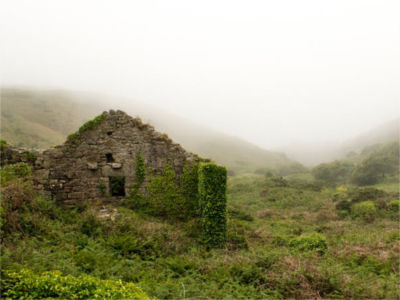The Interior: Difference between revisions
From Breaking Worlds
Created page |
Added description and image |
||
| (2 intermediate revisions by 2 users not shown) | |||
| Line 1: | Line 1: | ||
The parts of Arginet away from the coast have never been entirely civilised. Nominally they belong to the nobles of the | {{Categories|Geography}} | ||
The parts of [[Arginet]] away from the coast have never been entirely civilised. Nominally they belong to the nobles of the realm, but in practice they are largely untouched by authority, troubled by bandits and wild beasts. | |||
Though most people prefer the civilised life of the coastal regions, a few find the interior suits them - as evinced by the isolated manors, monasteries, and villages scattered throughout the hills and forests. | |||
Crofters and woodsfolk make up most of the working population of the interior. While the land is not the most fertile there is little competition for grazing or timber, and no crowds to drive away game. Some commoners also find that they like having a distant landlord who doesn’t try to collect the rent too often. As long as they are able to defend themselves, the smallholdings and villages of the interior can settle into an almost comfortable existence away from outside meddling. | |||
More privileged subjects may also settle here, most often seeking solitude but occasionally something else - mineral wealth, rare plants, a unique magical site… [[Animist orders]] sometimes establish monasteries out in the wilds; nobles are more likely to want a retreat from social opponents or simply a really good hunting lodge. Of course, it may be that a noble family has simply always been here, and has no desire to give up their connection to the land. | |||
[[File:Interior.jpg|frame]] | |||
There are also those who live here because they have nowhere else to go. Outlaws fleeing from the law can often escape to the interior, and as long as they have the skills to live off the land or the luck to be taken in by sympathetic locals they can lay low for a very long time. But just as often they do not abandon their criminal ways. Robbery, looting, sheep-rustling, and banditry can maintain a life here - though a marginal one - and because the authority of the law is spread so thinly it may be months or even years before outlaws are hunted down and brought to justice. | |||
Latest revision as of 17:42, 3 August 2017
The parts of Arginet away from the coast have never been entirely civilised. Nominally they belong to the nobles of the realm, but in practice they are largely untouched by authority, troubled by bandits and wild beasts.
Though most people prefer the civilised life of the coastal regions, a few find the interior suits them - as evinced by the isolated manors, monasteries, and villages scattered throughout the hills and forests.
Crofters and woodsfolk make up most of the working population of the interior. While the land is not the most fertile there is little competition for grazing or timber, and no crowds to drive away game. Some commoners also find that they like having a distant landlord who doesn’t try to collect the rent too often. As long as they are able to defend themselves, the smallholdings and villages of the interior can settle into an almost comfortable existence away from outside meddling.
More privileged subjects may also settle here, most often seeking solitude but occasionally something else - mineral wealth, rare plants, a unique magical site… Animist orders sometimes establish monasteries out in the wilds; nobles are more likely to want a retreat from social opponents or simply a really good hunting lodge. Of course, it may be that a noble family has simply always been here, and has no desire to give up their connection to the land.

There are also those who live here because they have nowhere else to go. Outlaws fleeing from the law can often escape to the interior, and as long as they have the skills to live off the land or the luck to be taken in by sympathetic locals they can lay low for a very long time. But just as often they do not abandon their criminal ways. Robbery, looting, sheep-rustling, and banditry can maintain a life here - though a marginal one - and because the authority of the law is spread so thinly it may be months or even years before outlaws are hunted down and brought to justice.